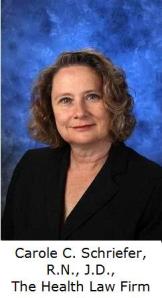New England Compounding Pharmacy Linked to Meningitis Outbreak Suspected of Violated License
 By George F. Indest III, J.D., M.P.A., LL.M., Board Certified by The Florida Bar in Health Law
By George F. Indest III, J.D., M.P.A., LL.M., Board Certified by The Florida Bar in Health Law
The compounding pharmacy behind the meningitis outbreak was allegedly not following the requirements of its state license, according to the Massachusetts Department of Health (DOH) in a released statement on October 10, 2012.
To read the entire statement from the Massachusetts DOH, click here.
The New England Compounding Center (NECC) shipped more than 17,000 vials of a steroid to pain clinics in 23 states, including Florida. The Centers for Disease Control and Prevention (CDC) is now reporting 214 cases of meningitis and 15 deaths associated with the fungal infection. NECC has surrendered its license and has recalled all medications. To see a blog I previously wrote about the recall and compounding facility shutting down, click here.
Under Law NECC Was Only Suppose to Produce Medication for Patient-Specific Prescriptions.
The Massachusetts DOH representative said under state law the NECC was only supposed to produce medications for patient-specific prescriptions. It is believed the company violated state law governing those pharmacies.
Apparently the DOH has had issues with the NECC prior to the outbreak. According to the statement, in 2006 the NECC received a warning letter from the Massachusetts DOH. The letter stated the company was operating more like a drug manufacturing firm than a compounding pharmacy.
All Compounding Pharmacies Now Under the Microscope.
On October 10, 2012, the Board of Pharmacy sent out an alert to all compounding pharmacies in Massachusetts to reinforce the state rules. The Board also issued an order requiring that all compounding pharmacies in the state sign an affidavit attesting compliance with all laws and regulations. The Massachusetts DOH officials do not believe any other pharmacies are operating outside of the rules, but said the alert was a precautionary measure.
Click here to see the alert from the Board of Pharmacy.
Compounding Pharmacy in Florida Faced Fungal Outbreak.
Florida has seen its share of fungal outbreaks. I previously blogged about the problems encountered by Franck’s pharmacy in Ocala, Florida. It has been accused of distributing eye medications that contained a fungal infection. Click here for the first blog and here for the second blog.
Contact Health Law Attorneys Experienced in Representing Pharmacies and Pharmacists.
The Health Law Firm represents pharmacists and pharmacies in investigations, regulatory matters, licensing issues, litigation, inspections and audits. The firm’s attorneys include those who are board certified by The Florida Bar in Health Law as well as licensed health professionals who are also attorneys.
To contact The Health Law Firm please call (407) 331-6620 or (850) 439-1001 and visit our website at www.TheHealthLawFirm.com.
Comments?
What do you think of this story? Please leave any thoughtful comments below.
Sources:
Smith, Michael. “Meningitis: Pharmacy in Outbreak Violated License.” MedPage Today. (October 11, 2012). From: http://www.medpagetoday.com/Neurology/GeneralNeurology/35276?utm_source=breaking-news&utm_medium=email&utm_campaign=breaking-news
Biondolillo, Madeleine Dr. “Statement of Dr. Madeleine Biondolillo Director of the Bureau for Health Care Safety and Quality.” Department of Public Health Massachusetts (October 10. 2012). From: http://www.mass.gov/eohhs/docs/dph/quality/boards/pharmacy-necc-biondolillo-statement.doc
Associated Press. “CDC: US Meningitis Outbreak Growing, 14 Dead.” Florida Today. (October 11, 2012). From: http://www.floridatoday.com/viewart/20121011/HEALTH/121011041/CDC-US-meningitis-outbreak-growing-14-dead?odyssey=tab%7Ctopnews%7Ctext%7CLocal%20News
About the Author: George F. Indest III, J.D., M.P.A., LL.M., is Board Certified by The Florida Bar in Health Law. He is the President and Managing Partner of The Health Law Firm, which has a national practice. Its main office is in the Orlando, Florida, area. www.TheHealthLawFirm.com The Health Law Firm, 1101 Douglas Ave., Altamonte Springs, FL 32714, Phone: (407) 331-6620.
“The Health Law Firm” is a registered fictitious business name of George F. Indest III, P.A. – The Health Law Firm, a Florida professional service corporation, since 1999.
Copyright © 1996-2012 The Health Law Firm. All rights reserved.










